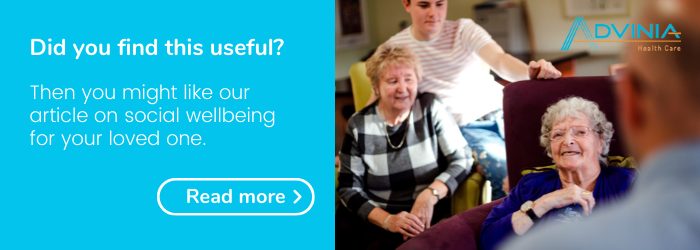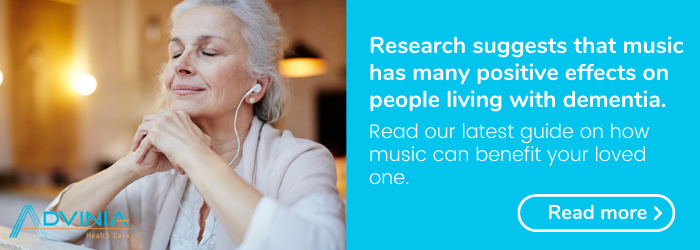Tips on how to keep well in later life
Emotional wellbeing is as vital as your physical health, so you need to put in the work to maintain it.
It doesn’t matter what age you are – if you want to be healthy and happy, you need to look after your body and your mind.
In this article we explore the range of activities and techniques that are proven to boost emotional wellbeing.
Here’s a summary of the main emotional wellbeing points we’ll cover in this article
- Creating connections and finding purpose in our lives is vital for emotional wellbeing.
- Reminiscence and nostalgia sessions inspire meaningful conversations, stimulate memory and spark joy.
- Activities including intergenerational visits, pet therapy, mindfulness sessions and learning new things have a positive impact.
- It’s crucial to maintain bonds with your community groups.
- Finding time to give something back to others less fortunate in your community is good for the soul.
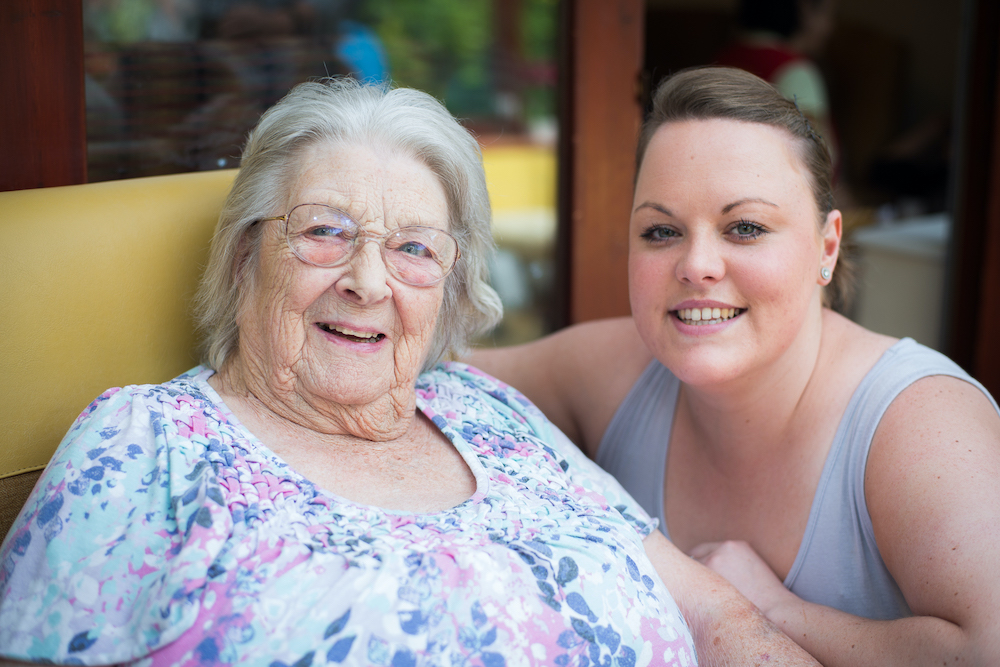
Why emotional wellbeing is important
Medical studies have shown a direct link between poor mental health and physical illness.
The British Heart Foundation’s research found that people who experience symptoms of depression are more likely to go on to develop heart disease or suffer a stroke.
In later life, where it’s reported that many people experience higher levels of isolation and loneliness, emotional wellbeing can suffer.
That’s why it’s important to recognise the challenges and to take steps to boost the emotional wellbeing of yourself and your loved ones wherever you can.
This can be particularly challenging for older people, and they may need lots of support to keep themselves emotionally well.

Our Resident Engagement and Wellbeing Programme
In Advinia Care Homes, we recognise the importance of a holistic approach to care.
Our Resident Engagement and Wellbeing Programme is called S.P.E.C.S. It covers the Social, Physical, Emotional, Cognitive and Sensory areas.
We strive to make each day meaningful for Residents, and every member of our care teams is committed to this goal.
Here’s our advice on how to boost emotional wellbeing for you or your loved one using the Advinia approach.

Emotional Wellbeing: Taking our cue from the NHS
Did you know that the NHS has published their guide to the five steps towards mental wellbeing?
They have identified 5 important things you can do to look after your mind
- Connect with other people
- Be physically active
- Learn new skills
- Give to others
- Be in the present moment (mindfulness)
The NHS guidance is all about creating positivity, meaning and a sense of belonging.
At Advinia Healthcare, we’ve incorporated these suggestions into our S.P.E.C.S programme for Residents.
We’ve seen first-hand what a positive impact they have on Residents, and we strive to create Moments that Matter whenever the opportunity presents itself.
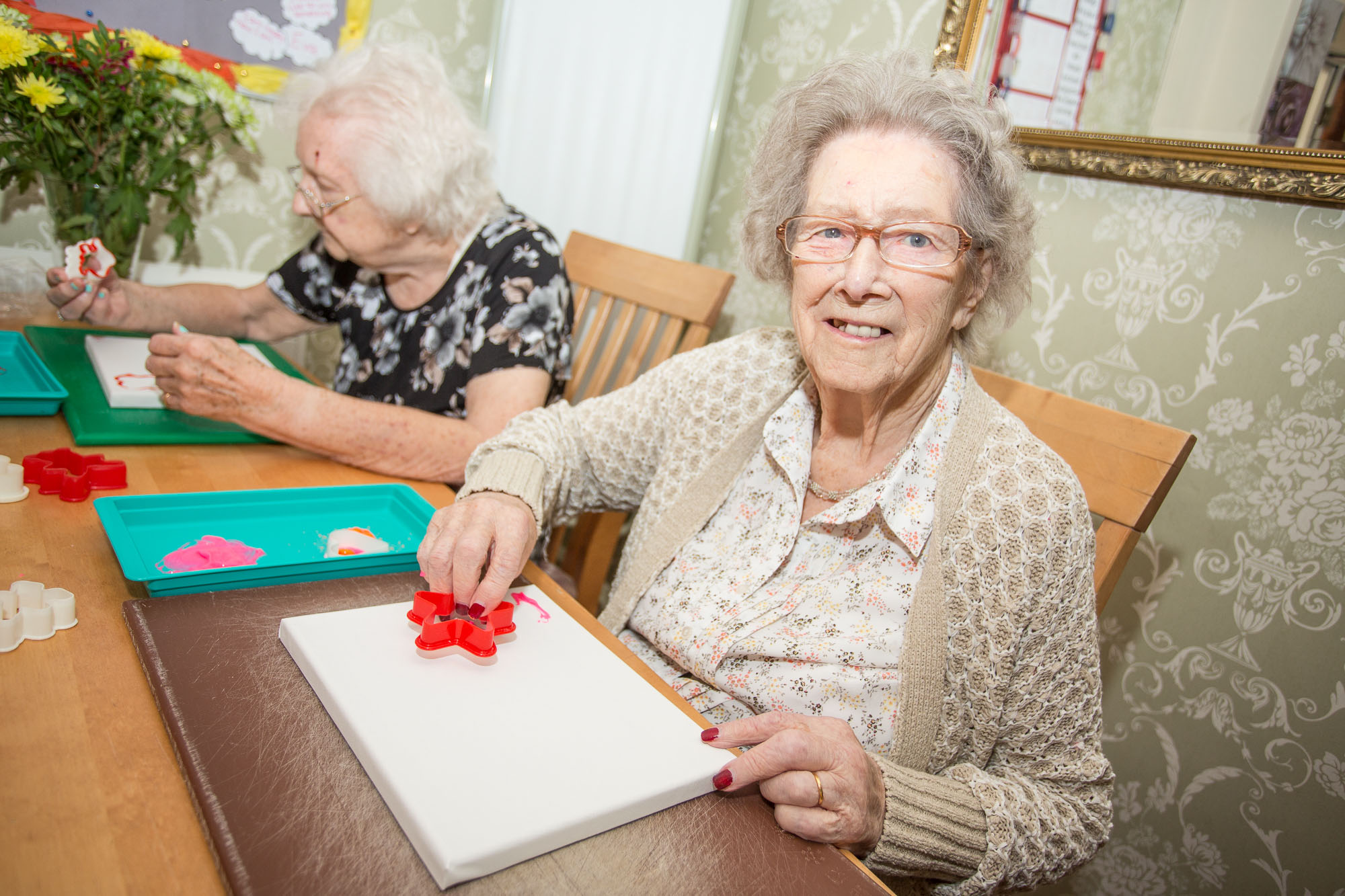
Activities to boost emotional wellbeing
These are some of the activities recommended for Residents to support their emotional wellbeing.
Nostalgia Sessions and emotional wellbeing
Older people have collected a treasure trove of memories over their lives.
These memories might be deeply personal, or they could be of events shared by the global community.
It’s valuable to take the time to look back, talk about those memories and share thoughts and feelings.
Not only do these life events provide an excellent starting point for a discussion, but they bring back joyful moments from the person’s life.
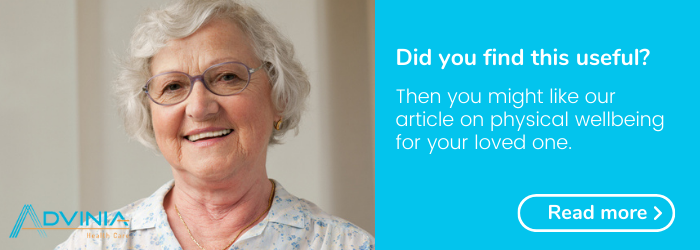
Nostalgia resources for dementia
For people living with dementia, they can also help to spark memories and connections.
We subscribe to an excellent resource called The Daily Sparkle, created for people living with dementia.
It is a terrific reminiscence tool that gives our Care Colleagues inspiration for activities.
In a stimulating and fun format, the Daily Sparkle reminds you of what happened on that day and also takes a look back at ‘the way things used to be’.
One day we might be hearing about how the Residents reacted when they first listened to The Beatles, and the next, we might be discussing ration books and what they ate when times were tough.
Sharing memories and experiences help build connections, and we’ve seen that in our Home communities.
There are many routes to reconnect with the past, such as creating memory boxes, looking at old pictures, hearing music, and watching films.
When you do that as a group or one-to-one with a loved one, you’ll be amazed by how positive the impact can be.

Animal Therapy for emotional wellbeing
We find that animal visitors have a profound impact on Residents, bringing them comfort and connection.
Plenty of volunteer pet owners have trained their animals through the Pets As Therapy (PAT) charity.
The mission of PAT is to give people access to the companionship of animals, no matter what their circumstances may be.
In our Care Homes, we’ve welcomed all kinds of lovely animals in for a visit – from dogs to Alpacas, no less!
When Larch Green Alpacas paid a visit to Residents at our Hill View Care Home in Clydebank, the heart-warming pictures were shared across the world.
Spending time stroking and petting an animal can be very soothing and comforting.
It’s fair to say that our animal visitors are more popular than humans!
Try to find these resources in your local community because they are invaluable.

Spending time with younger people
The power of intergenerational friendship is incredible.
We often see Residents in our Care Homes light up as children from nurseries or schools drop in for a visit.
It can be easy to become disconnected from younger generations, particularly if you don’t have children or grandchildren in your life.
But there are plenty of ways to connect with younger people through volunteering schemes and clubs.
It could be as simple as reading stories to children in the local library or attending community groups where intergenerational connections are encouraged.
Conversations with children can be fantastic for older people. Kids often ask lots of questions, are thrilled to hear about how life has changed and love to chat about everything and anything.
Intergenerational partnerships for emotional wellbeing
In our Care Homes, we often invite school classes to visit us or offer space for playgroups to meet because we see how much Residents love having children around.
During the year alone, our Homes have welcomed nursery carol singers, primary school well-wishers, and enjoyed family fireworks with youngsters.
We can do group activities such as crafting, drawing, or baking with older children.
It’s great to see how much everyone gets from doing activities together.

Learn something new
Learning should be a lifelong pursuit for us all – it brings so much to our lives.
Research has found that when people learn and develop, it boosts their self-esteem and often leads to social interactions.
From an emotional wellbeing perspective, it keeps the brain active and often facilitates social connections.
There are so many ways to learn new things, especially as we have many online resources at our fingertips.
Advinia Activity Co-ordinators spent lots of time running sessions to help Residents learn new things.
It could be a new game, a crafting skill, or discovering more about a religious celebration.
The important thing is to broaden Residents’ horizons and introduce them to new things.

Using virtual reality experiences to travel and learn
One of our most popular new activities is virtual travel via our partner, HeyGo.
The Residents get together in our cosy lounges to take a journey to one of the world’s most fascinating places.
When they arrive virtually, a live tour guide is there to greet them, and together they explore the surroundings.
One Resident at Hammerwich Hall was able to return to the place they honeymooned many years ago via HeyGo, and it was a special moment.
In 2021, the Residents also enjoyed trips to the French Riviera and Hampton Hall, to name but two.
Other Residents have finally got to explore the places they’ve always dreamed of visiting, finding out about the history and heritage of far-flung locations.
Guest speakers
Travel isn’t the only way to engage with new places or different ways of thinking.
We often invite speakers into the Care Homes to talk about different fascinating subjects and encourage Residents who have particular interests or passions to share their knowledge.
When friends and family visit, we take the time to talk to them and often discover they have expertise to share.
Some have arts and crafts backgrounds, others may speak on their hobbies, or they could have skills to share.
By connecting and being curious, you’ll find many people who’ll help you learn new things.

Mindfulness – are you present?
You may have heard a lot about mindfulness in the last few years.
In essence, mindfulness is about being present in the moment and experiencing the now.
Meditation is one of the most popular mindfulness techniques, and it can be as simple as sitting quietly and following the movement of your breath.
You’ll find a myriad of meditation resources online, including guided meditations for you to follow.
We find some Residents really enjoy guided meditation sessions, while others prefer different mindfulness techniques.
Think about the senses and how to use sensory experiences to connect yourself in the moment.
Emotional wellbeing and sensory gardens
Some of our Care Homes have sensory gardens where Residents can spend peaceful moments feeling at one with nature.
They breathe in the scents of the plants and flowers, feel the breeze on their faces and listen to birdsong. It’s simple but effective.
During our ‘Advinia in Bloom 2021’ competition, many of the Homes created sensory gardens in their grounds. There was also a wildlife photography class at Bishop’s Cleeve.
There are plenty of sensory mindfulness sessions where we use music, lights, art and textures to help ground Residents.
Taking notice of the present is the fifth of the NHS’ steps to wellbeing, and it’s essential.
Bringing calm and clarity to the mind and being present in the moment is so good for your emotional health.
Emotional Wellbeing and Spirituality
Many of us have deep religious beliefs and a vital spiritual life.
Our interaction with our faith community or religious practices is incredibly important to us.
When people get older, they may find it harder to get to places of worship or continue practising their faith as they once did.
Yet keeping a strong connection to faith leaders, fellow worshippers, and our religious communities is essential for our emotional wellbeing.
Spiritual practice and emotional wellbeing
The Residents in our Care Homes come from many different religions, and so we look to find ways to keep their religious life active.
We invite faith leaders to visit, screen virtual services, find out what religious practices they wish to continue and invite discussions.
For example, Pastor Tom Bonnar conducted cherished weekly services for Residents at Annan Court via video link.
By talking to Residents about their faith, we find we get to know them on a deeper level and learn more about what’s important to them.
If you are trying to help a loved one keep their connection to their religion in later life, reach out to faith leaders and community members.
You’ll find many groups are already operating community outreach, and there may be one-to-one options for those who struggle with mobility or are housebound.
We find that Residents with an active spiritual life get a great deal of happiness and purpose from their religion.
Charity and its impact on emotional wellbeing
Giving to others and performing charitable acts is a vital part of emotional wellbeing.
Research shows that people who are interested and engaged in helping others are more likely to rate themselves as being happy.
Acts of kindness don’t need to be complicated, and there are so many ways to do something for others.
Whether that’s leaving flowers on park benches to brighten a stranger’s day, baking cakes for a fundraiser or putting your skills to work as part of a charity drive.
Charitable events at Advinia
At Advinia Care Homes, we think it’s simple – doing good feels good.
We encourage Residents to take part in different charity initiatives to help others, including projects such as:
- Knitting bonnets for premature babies
- Collecting for food banks
- Compiling care boxes for homeless people
- Creating patchwork squares for blankets sent to developing nations
In our Care Homes, we love working as a team to do something charitable and making a difference.
The boost to emotional wellbeing is undeniable, and we see the impact on Residents.
We hope you’ve found plenty of ideas and helpful advice in our guide to emotional wellbeing.
Remember, the most important thing is to get started, so don’t be overwhelmed.
Small steps quickly add up – and you’ll soon see the results.


